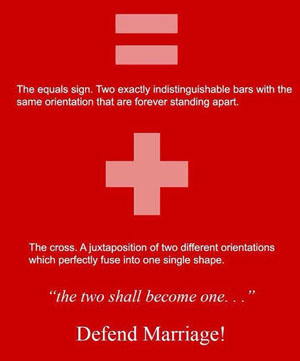 The Bible directly states that a gay relationship is wrong:
The Bible directly states that a gay relationship is wrong:
Lev 18:22
22 You will not lie with a man (זָכָר) as with woman (נְקֵבָה): it is abomination (תּוֹעֵבָה).
MKJV
But it is much deeper than that. Homosexuality is a sign of something much, much worse (not saying it is a greater sin). Such a thing is naturally shameful and done in secret. When it is no longer done in secret it shows that our society has become full-fledged ungodly. Abomination here is toavah (תּוֹעֵבָה) meaning ‘disgusting’. Pictographically it means, ‘behold, the sign that the house of the eye has been established.’ The eye is that symbol on the back of our dollar bill. Its modern origins date back to ancient Babylon with the tower of Babel. However, it’s meaning dates back to when Adam and Eve sinned. The Serpent promised them illumination; that is what the eye in this context represents, the promise of the Serpent. Satan appears as a messenger of light because our Savior, God is light. The anti-messiah spirit doesn’t just mean ‘against to the Messiah’ but to copy Him in every way shape and form to deceive the very elect if it were possible.
Part of the reason why this is such an issue in the Church is because it has been taught the Torah, the first five books of the Word of God, has been crucified. To what degree a person believes this to be so determines where they stand on homosexuality. But it was established at creation and embedded in nature that heterosexuality is how God formed our world to operate.
Gen 1:27
27 So God created man in his own image, in the image of God created he him; male (זָכָר) and female (נְקֵבָה) created he them.
KJV
Zachar (זָכָר) means ‘male’. The action is ‘to remember’ by speaking and acting on behalf of another, ‘to give’; the concrete is ‘male’ or to ‘perforate’; and the abstract is ‘memorial’. One modern English term would be ‘penis’.
N’qavah (נְקֵבָה) means ‘female’. The action is ‘to pierce, to receive’; the concrete is ‘female, hole’ or ‘to be perforated’. One modern English term would be ‘vagina’.
The concepts that go along with these words have more to do than just with anatomy; they include the God-given function of a male and female (not roles!). A male is to be the initiator, that is why the sign of the covenant is in his flesh; circumcision. That which initiates must first be set apart and cleansed before it can give the seed (Word of God) to another. That is why our hearts must be circumcised. If it is not then the seed we produce is not the Word of God but our own seed or that of the Adversary. This is why the Messiah was born a male; He is to initiate or act on behalf of God.
A female is to be a receiver. This is why the Messiah was born of a virgin. A virgin is someone who has not known a man and received his seed. The seed that produced the Messiah came from God passed down through Eve, not a man (Gen 3:15). The female is to take what she has received and use it to produce a blessing. We, the Bride of the Messiah, are to take on the function of the female. God is the one who initiates, gives us His seed/ Word, and we are to use it to produce a blessing in our life and the lives of others.
1 John 4:19
We love Him because He first loved us.
KJV
In the society we live in today, nobody knows the functions of a male or female. This can be viewed as the spiritual preparation for the physical manifestation of blatant homosexuality. Our generation no long knows what to think of such things. Most don’t feel that is right, but neither do they feel that it is necessarily wrong. Yet, because of the draw of society, they are forced to at the very least tolerate it and be so ‘open minded’ that their brain falls out. If a person or organization does not tolerate it, they are attacked, ridiculed, and viewed as ‘primitive’ and ‘barbaric’. It should be obvious that such behavior is not born of God but from our Adversary. Our Adversary always expresses a perverted function of the female when he is week; namely he gets what he wants via coercion and deception. When he becomes strong, he expresses a perverted function of the male; namely he gets what he wants by force and abuse. We are on the verge of reentering the Dark Ages when Christians and Jews who cling to God will be persecuted, even unto to death. Our Messiah said such would be so in the End of Days.
We are not responsible to judge those who are not born of faith. Even those born of faith, we must be given the responsibility of a judge before we judge them. Our society today is composed of Godlessness. We and those who cherish our country long to hold on to what we have and many strive to do so. The only way we can change the fabric of society is to change the individuals who make up that society which is something only God by His spirit can ultimately do. In regards to the Church; homosexuality is a sin like any other. If a person truly has a sincere relationship with Jesus, they will strive to remove sin from their life as we all should. Paul never tolerated sin. If a person continued in his sin and did not repent, Paul admonished the churches he was responsible for to excommunicate them. If we practiced the same today, churches would be pretty empty.
The thing we must realize is that we are at a crossroads. God is sifting His people to find those who are truly His and those who aren’t. A separation is coming and will soon be at hand. Those who are truly His will be hated by both the world and those who say they are His but are of the synagogue or church of Satan. We need to make sure our heart and life is right. He has promised that in this sifting none of those who are His will be lost.
Amos 9:9
9 For, lo, I will command, and I will sift the house of Israel among all nations, like as corn is sifted in a sieve, yet shall not the least grain fall upon the earth.
KJV
We are on the verge of being called out of Egypt. Something I realized just the other day when I was reading about God make a way so He could dwell among His people:
You know how the books in the Torah are named based on one of the first word that appear and how that is the theme of the book? If we squish them together they tell us a story.
- בְּרֵאשִׁית – in the beginning; family of heads; first family
- שְׁמוֹת – names; character
- וַיְּקְרָא – and he called/ proclaimed
- בְּמִדְבַּר – in the wilderness; word/ thing (of God) produce a family
- דְּבָרִים – words; things (of God)
So what we have is, “The names and character of the first family which God proclaimed His word producing a family according to the things of God.”
- b’rashiyth tells a story about the first family God called.
- shemoth tells a story of the character of the family He called to which He gave His name and showed His character. Namely, He is the one who delivers us, leads us into the wilderness to speak to us and enter into an intimate relationship with us and makes a way so He can dwell among us.
- viyiqra tells a story about how the people He called fellowship with Him, how they set themselves apart, and He gives them His moedim.
- b’midbar tells a story of how God purifies His people removing the rebellious making a people ready to enter His rest; it is by His word.
- d’bariym tells a story about how Israel must hear and obey His word. If they do not then they will be under a curse but if they do then they will be blessed. It also foretells of a generation (the last) that will embrace the words/ things of God and be His people and He will be their God.
Remember to look up, our Redeemer is drawing close.
